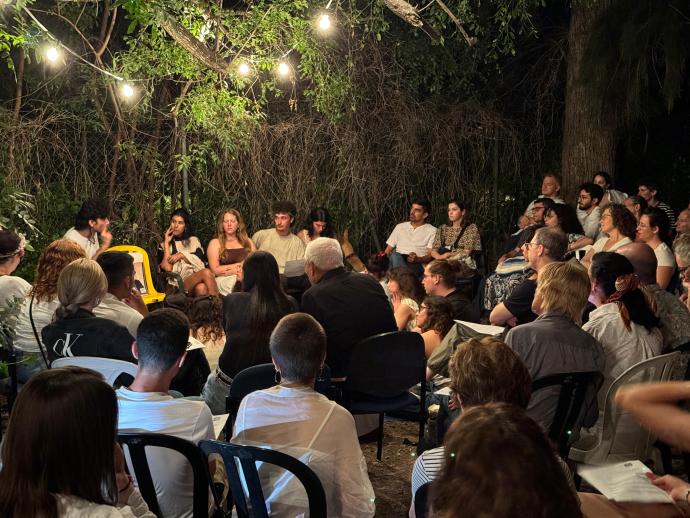‘Israel is at a crossroads now in terms of domestic policy, foreign policy, and its relationship with the wider Jewish world,” says Terry Newman, chairman of the public board of directors of BINA – the Home of Israeli Judaism. “And in all three areas, the key element is Judaism.” Bright, brash, and bold, Newman, 43, was born in London and has lived in Israel for close to 20 years, where he has created and managed numerous companies in the construction and healthcare sphere.
He says that while in the context of the Jewish experience the 20th century was known as the “Israeli century,” a period in which the State of Israel became the focal point through which the Jewish people defined their Jewishness, the 21st century will become known as the “Jewish century”: a period in which more and more Israelis will return to their Jewish identity – not necessarily through the government-run halachic (Jewish legal) systems but in a more communal fashion from the grassroots up.

In the 20th century, posits Newman, the Hebrew language was revived, millions made aliyah, and the country was built. Now, however, following the successes of the Israeli century, Israelis are searching for greater meaning in their lives. “When young Israelis now ask what separates them, or differentiates them, from other people around the world, more and more the answer will be their Jewish identity,” he says.
Expanding upon his initial statement regarding the influence of Jewish elements in domestic policy, foreign policy, and the Jewish world in Israel, Newman says that in domestic issues, one of the major areas of dispute is over the drafting of members of the Haredi community into the IDF, a hot-button subject that may eventually lead to the dissolution of the current government.
In Newman’s view, David Ben-Gurion’s 1947 decision that provided a religious exemption from military service to some 400 yeshiva students – which, decades later, was expanded to many thousands – granted the ultra-Orthodox elements within Israel special rights over the Jewish story. “I see the whole exemption from the army as a symptom of the original problem, which is: Who tells the Jewish story?” he says.
IN FOREIGN policy, he continues, Israel’s main narrative in recent years has shifted from the Holocaust and the rebirth of modern Israel to the Abraham Accords, which emphasize the joint Abrahamic roots of the Jewish people and members of Arab nations.

Finally, in the wider Jewish world, he says that the relationship between Jews in Israel and the Diaspora has increasingly focused more on Jewish issues, such as the controversy regarding women’s prayer groups at the Western Wall or the family Kotel area for egalitarian services.
For the past three or four generations, he says, mainstream Israelis from the public (mamlachti) school system “have outsourced all their Jewish needs to the halachic monopoly. That has to change.” As a result, they have largely ceded their practice of Judaism to their religious fellow Jews.
If we ever want to be able to give our children the sense of ownership of this country, we will need to
take our Judaism back.” Making Jewish practice available to the Jewish community at large in Israel, he explains, is the raison d’etre of BINA, which works to promote an open, egalitarian, and meaningful Jewish experience through community building, volunteering, and immersion in the Jewish texts. Today, the social and educational movement is the largest supplier of Jewish content to the public school system in Israel and also works extensively with the IDF.
According to the organization’s website, bina means “wisdom” in Hebrew. BINA is also a Hebrew acronym from a poem by Israeli national poet Chaim Nachman Bialik for “Home for the Creation of a Nation’s Soul,” which embodies the values of pluralism, social justice, social solidarity, democracy and peace – the Jewish values for which the movement stands.
BINA was established in 1996 in response to the breakdown in national unity following the assassination of prime minister Yitzhak Rabin. Since its founding, it has established numerous programs to help mainstream Israelis, as well as Jews from around the world, take ownership of their Jewish identity.
In 2006, BINA set up the first secular yeshiva in Tel Aviv and opened the Jerusalem Secular Yeshiva
in 2011; the Beer Sheva Secular Yeshiva in October 2015; and the Haifa Yeshiva, which opened in
September 2018. Newman identifies the organization’s target audience as students and graduates of
the mainstream public school system.
On a more grassroots level, BINA has built hubs in towns and cities throughout Israel called Beit BINA. Each one offers local communities an array of activities, such as educational and social-cultural programming, community building intergenerational events, regular Kabbalat Shabbat and Jewish holiday celebrations, and musical performances.
Beit BINA hubs are located in Tel Aviv, Haifa, Beersheba, Kibbutz Hazore’a, Kibbutz Ma’aleh Hahamisha, and Kibbutz Ramat Rachel. There are branches outside Israel as well, in Hungary, India, and Peru, and Newman says that they are expanding to additional countries. Newman notes that BINA recently won a tender to provide services for 15 Gaza border communities, ranging from religious life-cycle services to psychological services helping residents deal with the issues from the Oct. 7 attacks, framing it within Jewish tradition, and developing leadership within a
Jewish context.
Another expression of BINA’s adaptation of framing modern events within Jewish tradition is its educational treatment of Megillat Ha’atzmaut, the Israeli Declaration of Independence, written in 1948. “We view Megillat Ha’atzmaut as the only megillah [scroll] that the Jewish people has written in the last 2,000 years,” says Newman.
“If you look at a traditional Jewish festival, it’s normally made up of three parts – the family coming together, a meal with special food, and a text.” On Israeli Independence Day [Yom Ha’atzmaut], the family comes together for a big barbecue. BINA has taken the text and created a type of pseudo- Talmudic text, entitled Masechet Atzma’ut [Tractate Independence], written in the format of a Talmudic text by Dov Elbaum and published by Yediot and BINA.
The book features a compilation of over 160 original essays, interpretations, research items, discussions, and insights pertaining to each paragraph of Israel’s Declaration of Independence, written by leading Israeli and international Jewish scholars from across the social-political spectrum.
Perhaps the best way of explaining how interest in Judaism has supplanted pure Israeli culture, says Newman, can be found in Israeli music. “Once upon a time, you had Israeli music, and you had Jewish music, and they were very separate. Today, when my alarm clock went off, I had Moshe Peretz, the well-known Israeli pop singer, singing Tehillim [Psalms] on my radio. Now, you see more of a fusion of the two. I think it’s a really amazing thing.”
In Newman’s view, the Jewish needs of the mainstream Israeli population are expressed more around the family dinner table, in the school, and the army rather than in the synagogue.
These are as much emotional as intellectual. The Jewish heart and kishkes [guts] are integral parts of the Israeli-Jewish experience, he says. They are expressed within annual Jewish observances, including Shabbat and the Jewish holidays, and Jewish life cycle events, such as births, bar/bat mitzvahs, weddings, and funerals.
NEWMAN IS currently completing a book, together with Roni Sofer, expressing his ideas and philosophy of the different needs of the 20th “Israeli” century, and the current “Jewish” century as he calls them. The book will be released in Hebrew, followed by an English translation. “Mainstream Israelis are standing up and saying, ‘We want to take our Judaism back,’” he says. “If that is going to be what is going to define Israel going forward, we want to be a part of that story.”
BINA is working with Jews in Israel and around the world to help them connect with the Jewish world by focusing on three areas – Jewish life cycle events, the Jewish holiday cycle, and the Jewish
bookshelf.
This article was written in cooperation with BINA.
